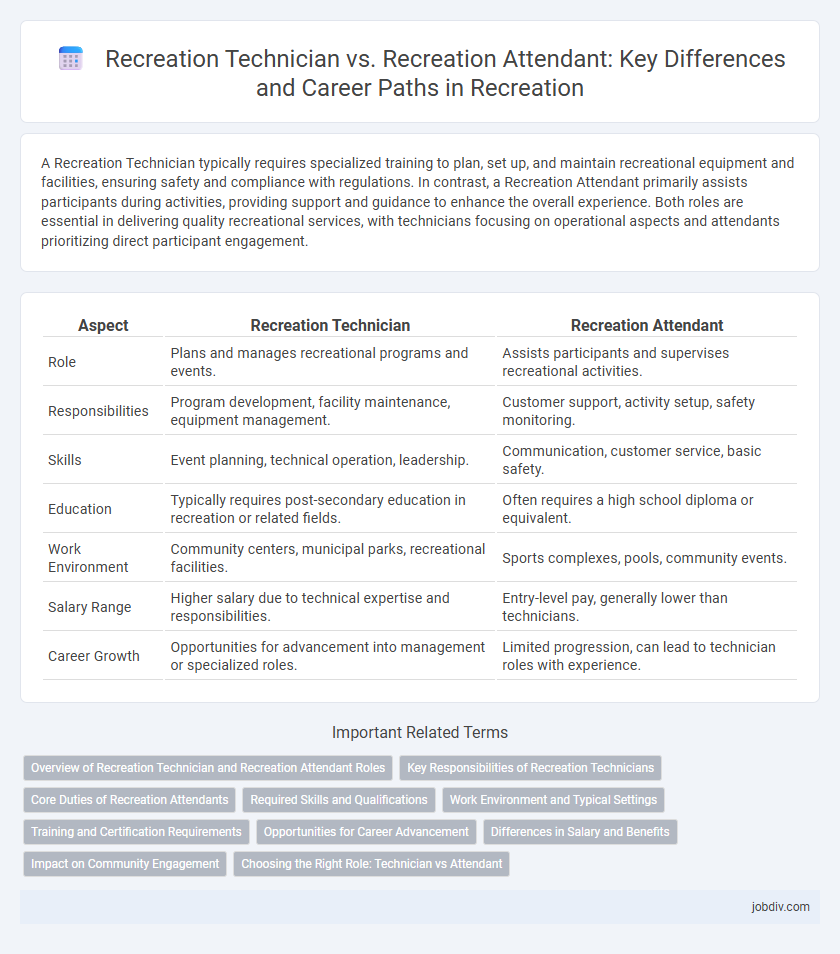A Recreation Technician typically requires specialized training to plan, set up, and maintain recreational equipment and facilities, ensuring safety and compliance with regulations. In contrast, a Recreation Attendant primarily assists participants during activities, providing support and guidance to enhance the overall experience. Both roles are essential in delivering quality recreational services, with technicians focusing on operational aspects and attendants prioritizing direct participant engagement.
Table of Comparison
| Aspect | Recreation Technician | Recreation Attendant |
|---|---|---|
| Role | Plans and manages recreational programs and events. | Assists participants and supervises recreational activities. |
| Responsibilities | Program development, facility maintenance, equipment management. | Customer support, activity setup, safety monitoring. |
| Skills | Event planning, technical operation, leadership. | Communication, customer service, basic safety. |
| Education | Typically requires post-secondary education in recreation or related fields. | Often requires a high school diploma or equivalent. |
| Work Environment | Community centers, municipal parks, recreational facilities. | Sports complexes, pools, community events. |
| Salary Range | Higher salary due to technical expertise and responsibilities. | Entry-level pay, generally lower than technicians. |
| Career Growth | Opportunities for advancement into management or specialized roles. | Limited progression, can lead to technician roles with experience. |
Overview of Recreation Technician and Recreation Attendant Roles
Recreation Technicians specialize in planning, implementing, and evaluating recreational activities, often requiring technical skills and certifications to ensure safety and compliance. Recreation Attendants primarily support the day-to-day operations of recreational facilities by assisting participants, maintaining equipment, and providing excellent customer service. Both roles contribute to enhancing community engagement and promoting healthy lifestyles through organized leisure programs.
Key Responsibilities of Recreation Technicians
Recreation Technicians manage and maintain recreational equipment, ensure the safety and cleanliness of facilities, and assist in planning and implementing recreational programs. They conduct inspections, perform routine maintenance, and troubleshoot technical issues related to recreation amenities. Their role extends to supporting Recreation Attendants by providing technical expertise and ensuring all activities comply with safety standards.
Core Duties of Recreation Attendants
Recreation Attendants primarily oversee the daily operations and maintenance of recreational facilities, ensuring safety and cleanliness to enhance visitor experiences. They assist guests by providing information, managing equipment rentals, and monitoring activities to enforce facility rules. Unlike Recreation Technicians who may focus on program development and specialized support, Attendants emphasize direct customer service and facility upkeep tasks.
Required Skills and Qualifications
Recreation Technicians require specialized technical skills in facility maintenance, equipment operation, and safety protocols, often possessing certifications in first aid and CPR. Recreation Attendants typically need strong interpersonal and customer service abilities, with a focus on facilitating activities and assisting participants. Both roles benefit from experience in recreation management and knowledge of community engagement, but Technicians lean more towards operational expertise while Attendants prioritize direct public interaction.
Work Environment and Typical Settings
Recreation Technicians typically work in structured environments such as community centers, parks, and recreational facilities where they assist in planning and implementing programs. Recreation Attendants are often found in settings like pools, gyms, and outdoor parks, focusing on supervising activities and ensuring participant safety. Both roles require presence in dynamic, public-facing environments that prioritize engagement and safety for diverse age groups.
Training and Certification Requirements
Recreation Technicians typically require specialized training involving certification programs such as CPR, first aid, and sometimes associate degrees in recreation management or related fields. Recreation Attendants often need minimal formal education, with on-the-job training covering basic safety protocols and customer service skills. Certification requirements for Recreation Attendants are generally less stringent, focusing on immediate operational competencies rather than extensive technical knowledge.
Opportunities for Career Advancement
Recreation Technicians often have greater opportunities for career advancement due to their specialized skills in planning and leading recreational activities, which qualify them for supervisory roles or program coordination positions. In contrast, Recreation Attendants primarily support facility operations and customer service, making their advancement prospects typically oriented towards senior attendant roles or specialization within specific recreation services. Both roles offer pathways to become Recreation Supervisors or Program Managers with additional experience and education.
Differences in Salary and Benefits
Recreation Technicians typically earn higher salaries than Recreation Attendants due to their advanced technical skills and responsibilities, with median wages around $17-$22 per hour compared to $12-$16 for attendants. Benefits for Recreation Technicians often include comprehensive health insurance, retirement plans, and paid leave, reflecting their specialized role, while Recreation Attendants may receive more limited or part-time benefits. The salary gap and benefit differences stem from the varying levels of training, job complexity, and employment status in recreation facilities.
Impact on Community Engagement
Recreation Technicians design and implement specialized programs that enhance community participation by meeting diverse interests and needs. Recreation Attendants facilitate direct interaction and support during activities, fostering inclusive environments and encouraging sustained engagement. Both roles contribute significantly to strengthening community bonds by promoting accessible and enjoyable recreational opportunities.
Choosing the Right Role: Technician vs Attendant
Recreation Technicians require specialized skills in equipment maintenance and facility management, making them ideal for those with technical expertise. Recreation Attendants focus on customer service and activity supervision, perfect for individuals passionate about direct guest interaction and event support. Choosing the right role depends on whether you prioritize hands-on technical work or engaging with participants to enhance recreational experiences.
Recreation Technician vs Recreation Attendant Infographic

 jobdiv.com
jobdiv.com